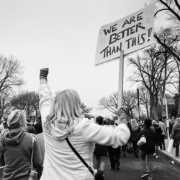Community owned change – we need to talk about anarchism
By Ed Whitelaw, Head of Enterprise & Regeneration at Real Ideas Organisation
 We need to talk about anarchism. Once you get past the often mis-leading, negative, bomb-chucking stereotypes of the proceeding centuries, many of the ideas contained within the, by definition, very broad church of anarchist thought are quite sensible. Indeed, in many cases emphasizing balance and moderation. They also have the potential to provide at least part of the answer to society’s infinitely complex growing list of challenges, from political disenfranchisement to growing inequalities, aging populations, environmental degradation and shrinking public services.
We need to talk about anarchism. Once you get past the often mis-leading, negative, bomb-chucking stereotypes of the proceeding centuries, many of the ideas contained within the, by definition, very broad church of anarchist thought are quite sensible. Indeed, in many cases emphasizing balance and moderation. They also have the potential to provide at least part of the answer to society’s infinitely complex growing list of challenges, from political disenfranchisement to growing inequalities, aging populations, environmental degradation and shrinking public services.
Be it by necessity and by design, anarchic ideas, and practice, are increasingly evident all around us. While the wider anarchist “movement” intermittently flares up, burning hot and fast, but ultimately short-lived like a virus in the popular mind – in moments such as Occupy – a more sustained, transformative genera of anarchism is growing, more like mycelium through the forest of society day-by-day.
These aren’t quick, but they are steady and cumulative steps, and coming from both directions – from activists and government alike – politics and politicians know this is needed. From localism, devolution and cooperative councils to the increasing prevalence of self-managing, self-organising, agile, matrix managed businesses and civic organisations. Running all the way from subsidiary in European Union, right the way through to energetic indy-towns such as Frome and Buckfastleigh. Though where this is often most evident is in the ever-growing UK-wide movement of enterprise driven social action: social enterprises, b-corps, community business, coops and just good businesses – a restless growing wave the anarchopreneurs balancing economic independence with social value, personal liberty with collective solidarity. This is beyond the politics of the Left or the Right, it is the politics community leadership – taking action and accepting social, and economic, responsibility.
South West England provides further examples. The Transition Towns movement grew out of Totnes, and just 20 minutes down the road, the “Plymouth Model”, the UK’s first Social Enterprise City where hundreds of socially enterprising organisations, with an enabling local government partner and a welcoming business community are driving everything from regeneration to education, from healthcare to clean energy and even the creative and digital industries. Towns like Watchet, where a group of local people, the Onion Collective (predominantly women) have painted an effective picture of what “taking back control” should actually look like. Igniting a range of locally owned community businesses following all-too-common market failures, resulting in the loss of local industry. Projects include a visitors’ centre, a new green space community park and regular summer street markets, even reimagining the East Quay waterfront as a new space for studios, restaurants, galleries and visitor accommodation.
This community owned – anarchic – action is increasingly seeping into the mainstream. From the recent incorporation of the South West Mutual, part of a national network of the soon-to-be people powered regional banks, to the Big Lottery’s own endowment trust – Power to Change – that is tirelessly working (in both Plymouth and Watchet) to create locally owned, community accountable businesses and services up and down England. And then, Carne Ross’s story of his remarkable journey from diplomate to anarchist – The Accidental Anarchist – lands slap-bang in the middle of your BBC viewing – now something is really up?
Britain today is alive with constructive anarchism, anarchic ideas and substantial real action.
We need to talk about anarchism. We need to talk about community owned change. Take Proudhon for instance, one of the leading anarcho-theoreticians, sometime described as the “connoisseur of paradox” (or other words, he understood the need for balanced view!), who first adopted the word anarchist to describe himself and along with Godwin is often credited with “creating” anarchism. His position here could be summarised in three parts:
- Participation – far from being the absence of governance, he saw anarchism as the mass participation in government: limiting but with necessary layers of government, built from the people or the workshop up. Initially, and primarily, this came about via economic more than political means, growing networks of social and economic administration – “the cure for social ills cannot be found on political level and must be sought in the economic roots of society”.
- Local ownership – his most famed pronouncement – “property is theft” wasn’t a statement against the ownership of private property, only against the disproportionate ownership of large scale capital and assets by private interest, and/or indeed the state, what he termed the “cumulative proprietors”. With an emphasis on democratic and social value, he welcomed private ownership and saw economic liberation as fundamental to wider political freedom – “political right requires to be buttressed by economic right”. In a Smithian way he was an advocate of genuine free trade, as an effective regulating structure for society and recognised that, to a larger extent, communities are often remarkably good at managing themselves. Proudhonism, often cited as the philosophical bedrock of anarcho-syndicalism, envisaged a society organized around cooperating local businesses-like enterprising organisations, working units of society (social enterprises, coops and community business, even SMEs?), inter-trading and federating as needed on the larger scale.
- Reform – flying the face of the anarchist caricature, Proudhon rejected revolution, favouring reform over time through education, fiscal policy, credit reform and new forms of social corporate ownership – he even tried to set up a mutual, Peoples’ Bank. At the heart of this was a good honest grasp of human nature, a Hayekian recognition of complexity, the value and need for personal liberty and individualism, well balanced with the important need for, and indeed facilitated by, community collective good.
We need to talk about anarchism. We need to move that anarchist debate beyond a quirk of the 19th century; beyond the flash of passion, courage, but ultimate tragedy of the Spanish Civil War; and beyond the unhelpful black bloc stereotypes. We need to move it to where it belongs – in our daily lives. Anarchism is more than a fringe political movement of the shadows, it is something that is happening and as C. S. Scott suggests with his “anarchist squint” it’s a way of looking, thinking and behaving. If we look at the world through the anarchist lens, we see it all around us and with many encouraging results.
While anarchism has often been good at defining what it is against, it is less clear when it comes to practical application and what it is for. Community enterprises are finding new, real ways for more people, often at the furthest fringes, to participate in society economically and therefore, also democratically. They are creating more meaningful forms of ownership, putting the means of production not in private or state hands, but in the hands of local people, and they are changing the way society works. Reforming healthcare, learning, social care, energy production, housing, pubs, venues, the creative industries, business services, finance and even banking – now government too? Isn’t this what Proudhon was talking about? We need to talk about anarchism.
Originally posted on Real Ideas Organisation blog on 19th July 2018





